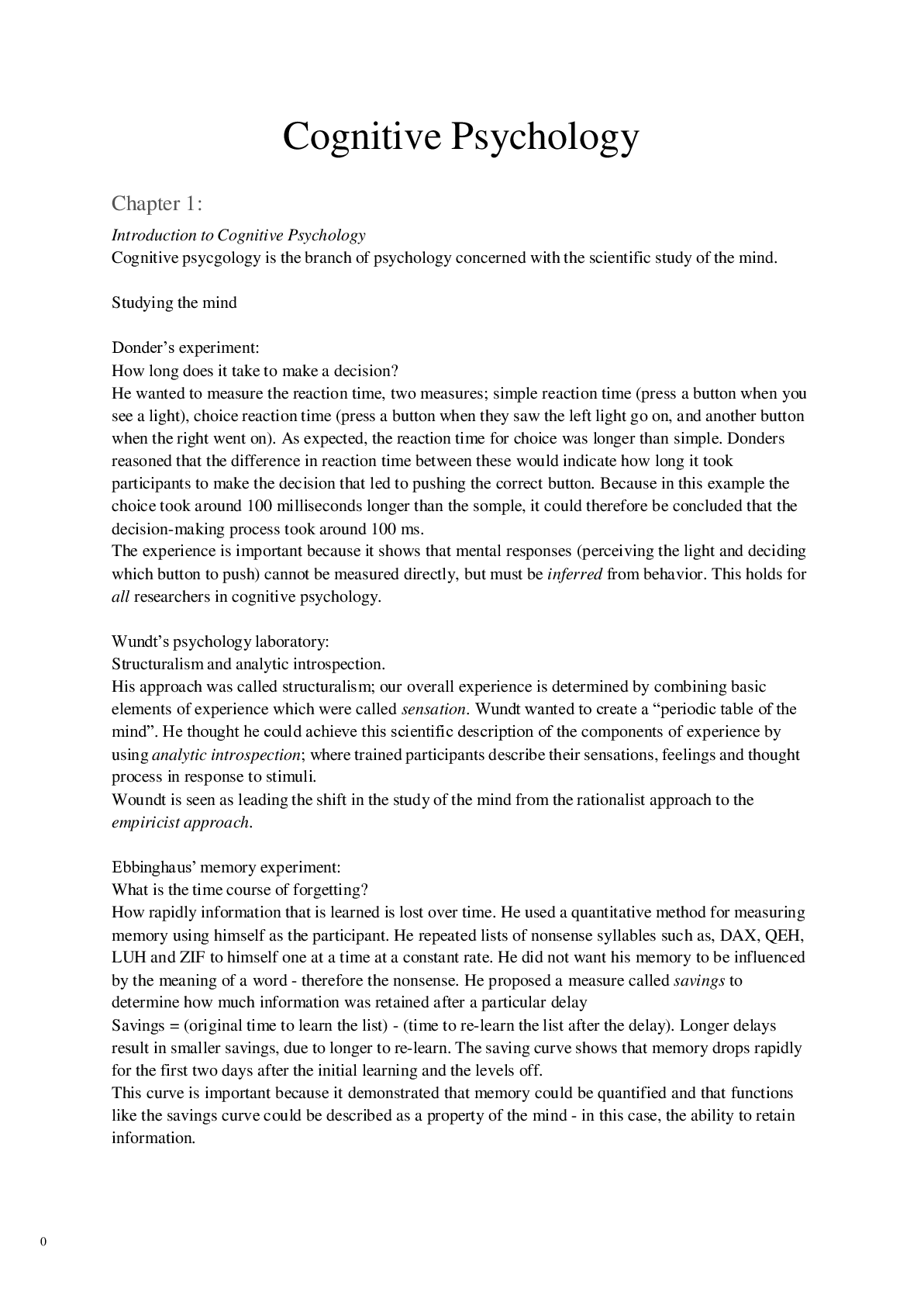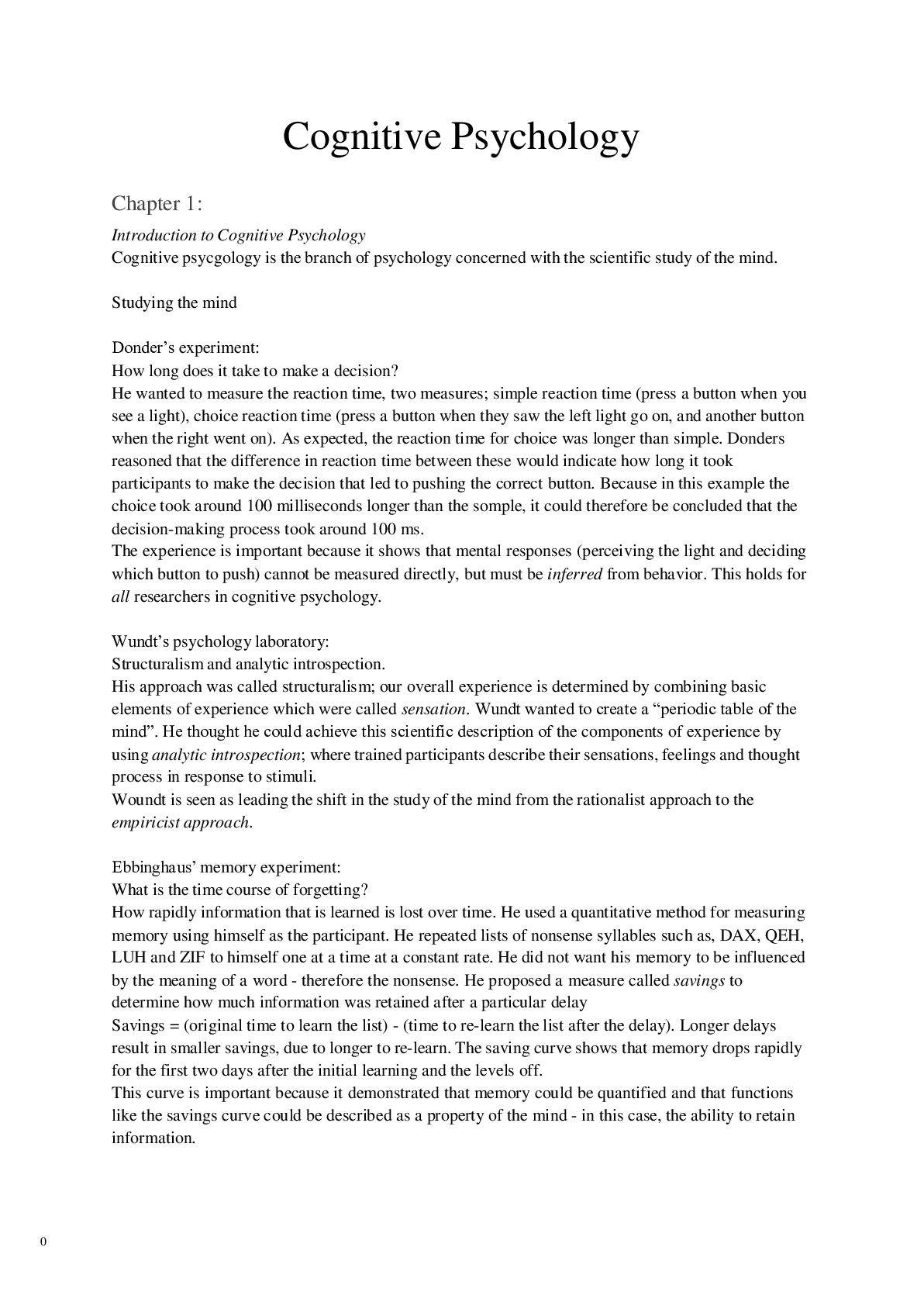Chapter 1:
Introduction to Cognitive Psychology
Cognitive psycgology is the branch of psychology concerned with the scientific study of the mind.
Studying the mind
Donder’s experiment:
How long does it take to make a decision?
He wanted to measure the reaction time, two measures; simple reaction time (press a button when you
see a light), choice reaction time (press a button when they saw the left light go on, and another button
when the right went on). As expected, the reaction time for choice was longer than simple. Donders
reasoned that the difference in reaction time between these would indicate how long it took
participants to make the decision that led to pushing the correct button. Because in this example the
choice took around 100 milliseconds longer than the somple, it could therefore be concluded that the
decision-making process took around 100 ms.
The experience is important because it shows that mental responses (perceiving the light and deciding
which button to push) cannot be measured directly, but must be inferred from behavior. This holds for
all researchers in cognitive psychology.
Wundt’s psychology laboratory:
Structuralism and analytic introspection.
His approach was called structuralism; our overall experience is determined by combining basic
elements of experience which were called sensation. Wundt wanted to create a “periodic table of the
mind”. He thought he could achieve this scientific description of the components of experience by
using analytic introspection; where trained participants describe their sensations, feelings and thought
process in response to stimuli.
Woundt is seen as leading the shift in the study of the mind from the rationalist approach to the
empiricist approach.
Ebbinghaus’ memory experiment:
What is the time course of forgetting?
How rapidly information that is learned is lost over time. He used a quantitative method for measuring
memory using himself as the participant. He repeated lists of nonsense syllables such as, DAX, QEH,
LUH and ZIF to himself one at a time at a constant rate. He did not want his memory to be influenced
by the meaning of a word - therefore the nonsense. He proposed a measure called savings to
determine how much information was retained after a particular delay
Savings = (original time to learn the list) - (time to re-learn the list after the delay). Longer delays
result in smaller savings, due to longer to re-learn. The saving curve shows that memory drops rapidly
for the first two days after the initial learning and the levels off.
This curve is important because it demonstrated that memory could be quantified and that functions
like the savings curve could be described as a property of the mind - in this case, the ability to retain
information.
0
William James’ Principles of Psychology:
Famous book principles of psychology. He observed the opservation of his own mind. The nature of
the mind:
Millions of items … are presented to my senses which never properly enter my
experience. Why? Because they have no interest for me. My experience is what I
agree to attend to … Everyone knows what attention is. It is the taking possession
by the mind, in clear and vivid form, of one out of what seem several
simultaneously possible objects or trains of thought … It implies withdrawal from
some things in order to deal effectively with others.
True today - still valid
Behaviourism
Watson founds behaviourism:
Watson became dissatisfied with the methods because 1) produced variable results from person to
person, 2) these results were difficult to verify. Watson proposed a new approach called behaviorism:
Psychology as the behaviourist sees it is a purely objective, experimental branch of
natural science. Its theoretical goal is the prediction and control of behaviour.
Introspection forms no essential part of its method, nor the scientific value of its
data dependent upon the readiness with which they lend themselves to
interpretation in terms of consciousness, the objective point of our attack.
Keypoint; 1) watson rejects introspection as a method, 2) observable behavior, not consciousness
(which involve unobservable processes such as thinking etc) is the main topic of study.
Watsons idea is closely associated with classical conditioning. Experiment from Pavlov; dogs could
be made to salivate to the sound of a bell, paired with food. Watson showed that the same principle
applied to humans.
Read More


